ACNB: Analysis of Contract and Negligence for Business Law, 2017
VerifiedAdded on 2020/01/16
|26
|7770
|392
Report
AI Summary
This report provides a comprehensive overview of the legal aspects of business contracts and negligence within the UK legal framework. It begins by identifying and explaining the essential elements required for the formation of a valid contract, including agreement, offer, acceptance, consideration, intention to create legal relations, certainty, and capacity. The report then discusses the impact of different types of contracts and analyzes the meaning and effect of various terms within contracts. It applies these contract elements to given business scenarios, evaluating the effect of different terms. Furthermore, the report contrasts liability in tort with contractual liability, explaining the nature of liability in negligence, including the elements of a tort of negligence and how a business can be vicariously liable. The report applies these elements to different business situations, providing a detailed analysis of the legal concepts. Finally, the concept of vicarious liability is discussed through a case study.

ASSIGNMENT SUBMISSION FORM This sheet must be submitted with your
assignment. Failure to complete, sign and submit this form will result in a mark of ‘0’
for the assignment.
Student Name
Student ID
Assessor Name
Qualification
Unit Number & Unit Title Unit 5: Aspects of Contrast and Negligence for Control
Assignment Title ACNB
Date of Submission 01/02/2017
By submitting this form and signing below, I declare that:
● I am the author of this assignment and that any assistance I received in its preparation is fully disclosed and
acknowledged in this assignment
● I also certify that this assignment was prepared by me specifically for this course
● I certify that I have taken all reasonable precautions to make sure that my work has not been copied by other
students
Page 1
assignment. Failure to complete, sign and submit this form will result in a mark of ‘0’
for the assignment.
Student Name
Student ID
Assessor Name
Qualification
Unit Number & Unit Title Unit 5: Aspects of Contrast and Negligence for Control
Assignment Title ACNB
Date of Submission 01/02/2017
By submitting this form and signing below, I declare that:
● I am the author of this assignment and that any assistance I received in its preparation is fully disclosed and
acknowledged in this assignment
● I also certify that this assignment was prepared by me specifically for this course
● I certify that I have taken all reasonable precautions to make sure that my work has not been copied by other
students
Page 1
Paraphrase This Document
Need a fresh take? Get an instant paraphrase of this document with our AI Paraphraser
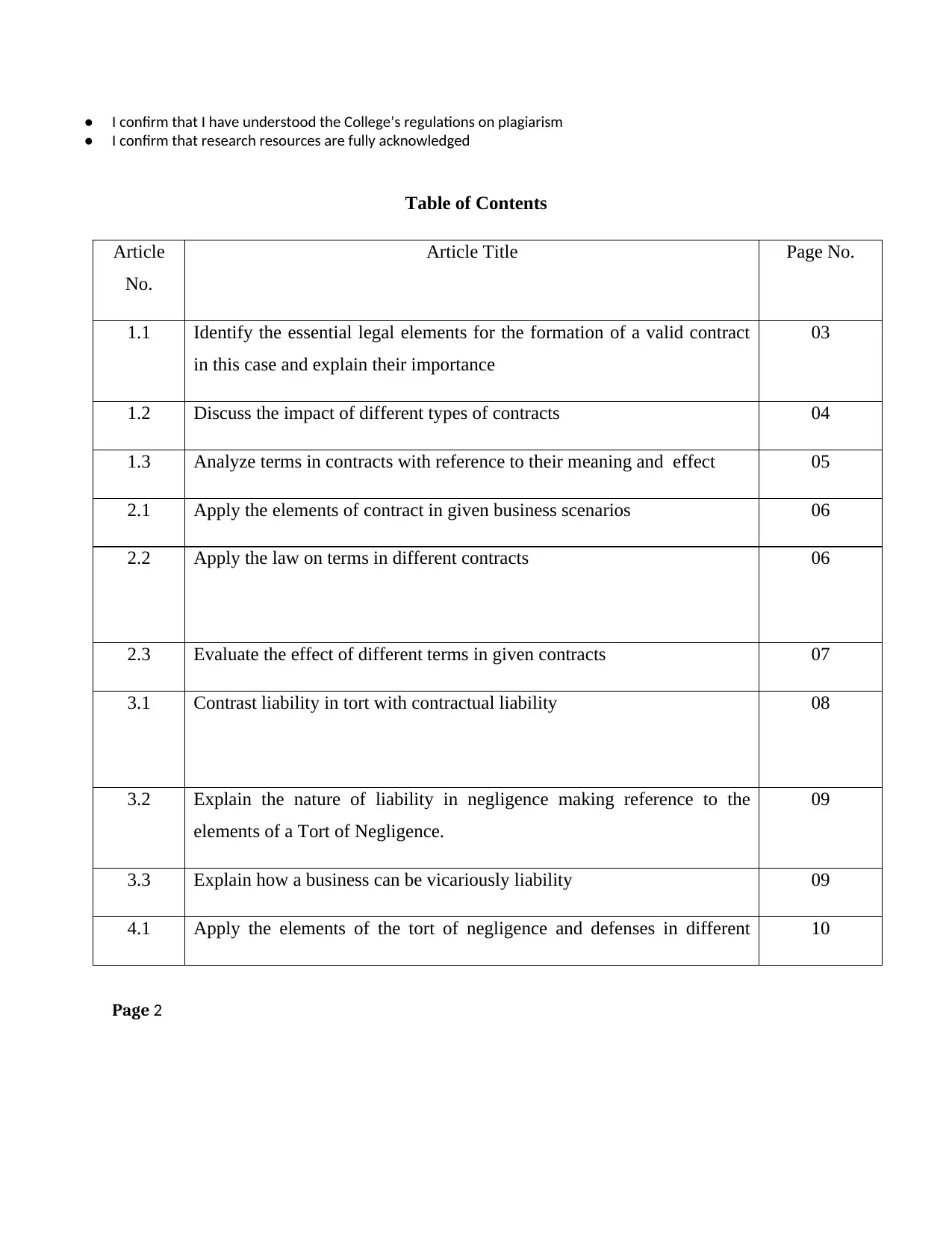
● I confirm that I have understood the College’s regulations on plagiarism
● I confirm that research resources are fully acknowledged
Table of Contents
Article
No.
Article Title Page No.
1.1 Identify the essential legal elements for the formation of a valid contract
in this case and explain their importance
03
1.2 Discuss the impact of different types of contracts 04
1.3 Analyze terms in contracts with reference to their meaning and effect 05
2.1 Apply the elements of contract in given business scenarios 06
2.2 Apply the law on terms in different contracts 06
2.3 Evaluate the effect of different terms in given contracts 07
3.1 Contrast liability in tort with contractual liability 08
3.2 Explain the nature of liability in negligence making reference to the
elements of a Tort of Negligence.
09
3.3 Explain how a business can be vicariously liability 09
4.1 Apply the elements of the tort of negligence and defenses in different 10
Page 2
● I confirm that research resources are fully acknowledged
Table of Contents
Article
No.
Article Title Page No.
1.1 Identify the essential legal elements for the formation of a valid contract
in this case and explain their importance
03
1.2 Discuss the impact of different types of contracts 04
1.3 Analyze terms in contracts with reference to their meaning and effect 05
2.1 Apply the elements of contract in given business scenarios 06
2.2 Apply the law on terms in different contracts 06
2.3 Evaluate the effect of different terms in given contracts 07
3.1 Contrast liability in tort with contractual liability 08
3.2 Explain the nature of liability in negligence making reference to the
elements of a Tort of Negligence.
09
3.3 Explain how a business can be vicariously liability 09
4.1 Apply the elements of the tort of negligence and defenses in different 10
Page 2
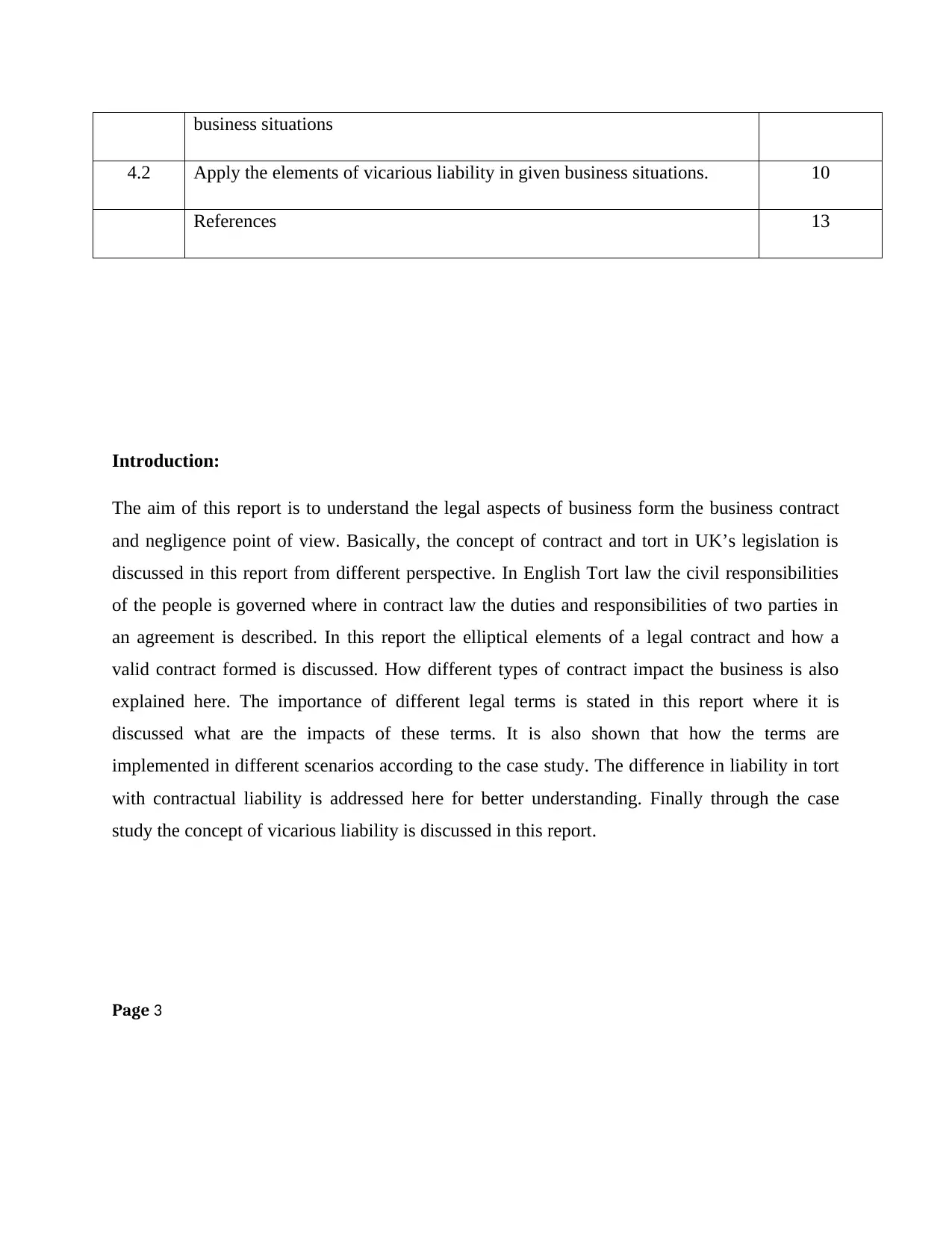
business situations
4.2 Apply the elements of vicarious liability in given business situations. 10
References 13
Introduction:
The aim of this report is to understand the legal aspects of business form the business contract
and negligence point of view. Basically, the concept of contract and tort in UK’s legislation is
discussed in this report from different perspective. In English Tort law the civil responsibilities
of the people is governed where in contract law the duties and responsibilities of two parties in
an agreement is described. In this report the elliptical elements of a legal contract and how a
valid contract formed is discussed. How different types of contract impact the business is also
explained here. The importance of different legal terms is stated in this report where it is
discussed what are the impacts of these terms. It is also shown that how the terms are
implemented in different scenarios according to the case study. The difference in liability in tort
with contractual liability is addressed here for better understanding. Finally through the case
study the concept of vicarious liability is discussed in this report.
Page 3
4.2 Apply the elements of vicarious liability in given business situations. 10
References 13
Introduction:
The aim of this report is to understand the legal aspects of business form the business contract
and negligence point of view. Basically, the concept of contract and tort in UK’s legislation is
discussed in this report from different perspective. In English Tort law the civil responsibilities
of the people is governed where in contract law the duties and responsibilities of two parties in
an agreement is described. In this report the elliptical elements of a legal contract and how a
valid contract formed is discussed. How different types of contract impact the business is also
explained here. The importance of different legal terms is stated in this report where it is
discussed what are the impacts of these terms. It is also shown that how the terms are
implemented in different scenarios according to the case study. The difference in liability in tort
with contractual liability is addressed here for better understanding. Finally through the case
study the concept of vicarious liability is discussed in this report.
Page 3
⊘ This is a preview!⊘
Do you want full access?
Subscribe today to unlock all pages.

Trusted by 1+ million students worldwide
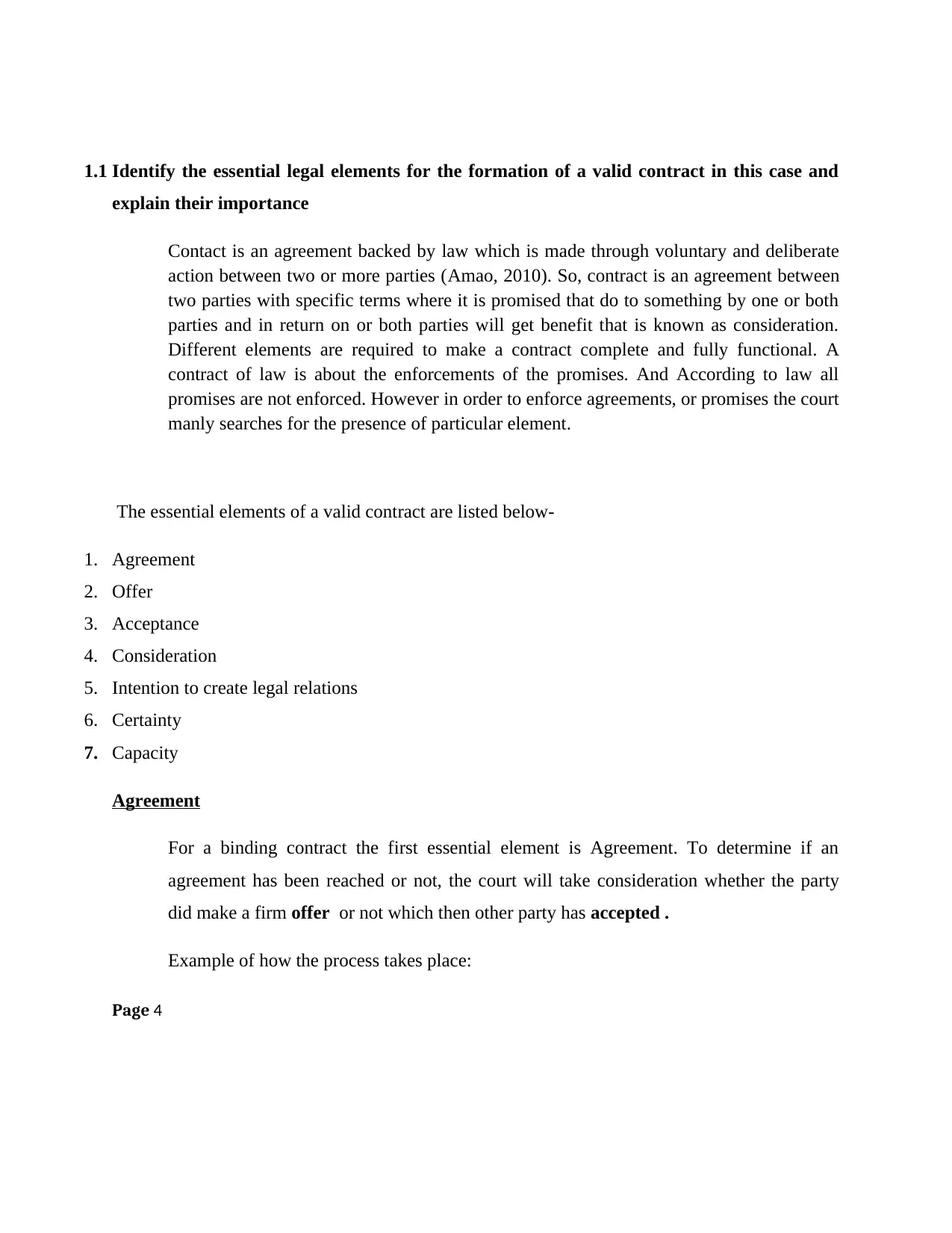
1.1 Identify the essential legal elements for the formation of a valid contract in this case and
explain their importance
Contact is an agreement backed by law which is made through voluntary and deliberate
action between two or more parties (Amao, 2010). So, contract is an agreement between
two parties with specific terms where it is promised that do to something by one or both
parties and in return on or both parties will get benefit that is known as consideration.
Different elements are required to make a contract complete and fully functional. A
contract of law is about the enforcements of the promises. And According to law all
promises are not enforced. However in order to enforce agreements, or promises the court
manly searches for the presence of particular element.
The essential elements of a valid contract are listed below-
1. Agreement
2. Offer
3. Acceptance
4. Consideration
5. Intention to create legal relations
6. Certainty
7. Capacity
Agreement
For a binding contract the first essential element is Agreement. To determine if an
agreement has been reached or not, the court will take consideration whether the party
did make a firm offer or not which then other party has accepted .
Example of how the process takes place:
Page 4
explain their importance
Contact is an agreement backed by law which is made through voluntary and deliberate
action between two or more parties (Amao, 2010). So, contract is an agreement between
two parties with specific terms where it is promised that do to something by one or both
parties and in return on or both parties will get benefit that is known as consideration.
Different elements are required to make a contract complete and fully functional. A
contract of law is about the enforcements of the promises. And According to law all
promises are not enforced. However in order to enforce agreements, or promises the court
manly searches for the presence of particular element.
The essential elements of a valid contract are listed below-
1. Agreement
2. Offer
3. Acceptance
4. Consideration
5. Intention to create legal relations
6. Certainty
7. Capacity
Agreement
For a binding contract the first essential element is Agreement. To determine if an
agreement has been reached or not, the court will take consideration whether the party
did make a firm offer or not which then other party has accepted .
Example of how the process takes place:
Page 4
Paraphrase This Document
Need a fresh take? Get an instant paraphrase of this document with our AI Paraphraser
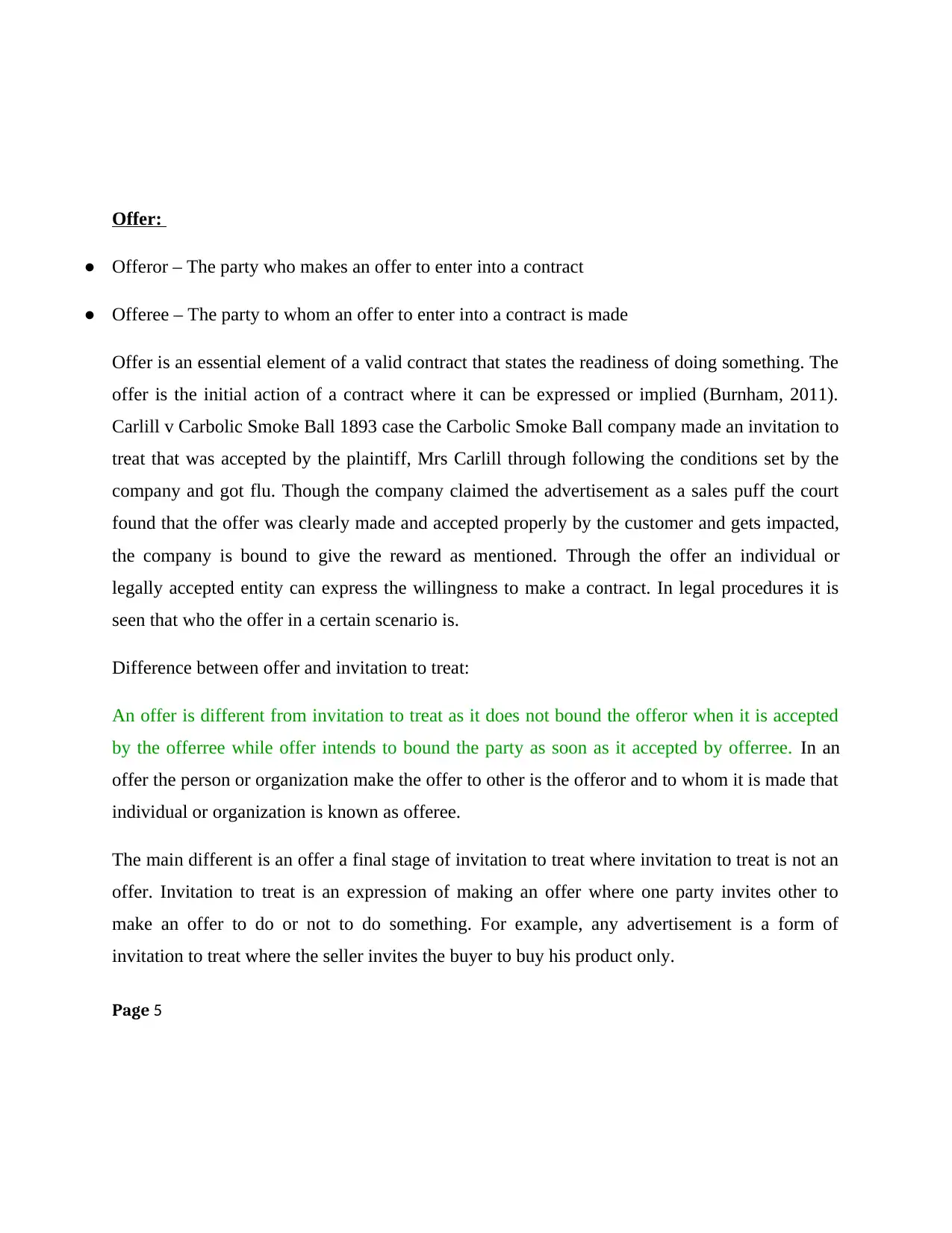
Offer:
● Offeror – The party who makes an offer to enter into a contract
● Offeree – The party to whom an offer to enter into a contract is made
Offer is an essential element of a valid contract that states the readiness of doing something. The
offer is the initial action of a contract where it can be expressed or implied (Burnham, 2011).
Carlill v Carbolic Smoke Ball 1893 case the Carbolic Smoke Ball company made an invitation to
treat that was accepted by the plaintiff, Mrs Carlill through following the conditions set by the
company and got flu. Though the company claimed the advertisement as a sales puff the court
found that the offer was clearly made and accepted properly by the customer and gets impacted,
the company is bound to give the reward as mentioned. Through the offer an individual or
legally accepted entity can express the willingness to make a contract. In legal procedures it is
seen that who the offer in a certain scenario is.
Difference between offer and invitation to treat:
An offer is different from invitation to treat as it does not bound the offeror when it is accepted
by the offerree while offer intends to bound the party as soon as it accepted by offerree. In an
offer the person or organization make the offer to other is the offeror and to whom it is made that
individual or organization is known as offeree.
The main different is an offer a final stage of invitation to treat where invitation to treat is not an
offer. Invitation to treat is an expression of making an offer where one party invites other to
make an offer to do or not to do something. For example, any advertisement is a form of
invitation to treat where the seller invites the buyer to buy his product only.
Page 5
● Offeror – The party who makes an offer to enter into a contract
● Offeree – The party to whom an offer to enter into a contract is made
Offer is an essential element of a valid contract that states the readiness of doing something. The
offer is the initial action of a contract where it can be expressed or implied (Burnham, 2011).
Carlill v Carbolic Smoke Ball 1893 case the Carbolic Smoke Ball company made an invitation to
treat that was accepted by the plaintiff, Mrs Carlill through following the conditions set by the
company and got flu. Though the company claimed the advertisement as a sales puff the court
found that the offer was clearly made and accepted properly by the customer and gets impacted,
the company is bound to give the reward as mentioned. Through the offer an individual or
legally accepted entity can express the willingness to make a contract. In legal procedures it is
seen that who the offer in a certain scenario is.
Difference between offer and invitation to treat:
An offer is different from invitation to treat as it does not bound the offeror when it is accepted
by the offerree while offer intends to bound the party as soon as it accepted by offerree. In an
offer the person or organization make the offer to other is the offeror and to whom it is made that
individual or organization is known as offeree.
The main different is an offer a final stage of invitation to treat where invitation to treat is not an
offer. Invitation to treat is an expression of making an offer where one party invites other to
make an offer to do or not to do something. For example, any advertisement is a form of
invitation to treat where the seller invites the buyer to buy his product only.
Page 5
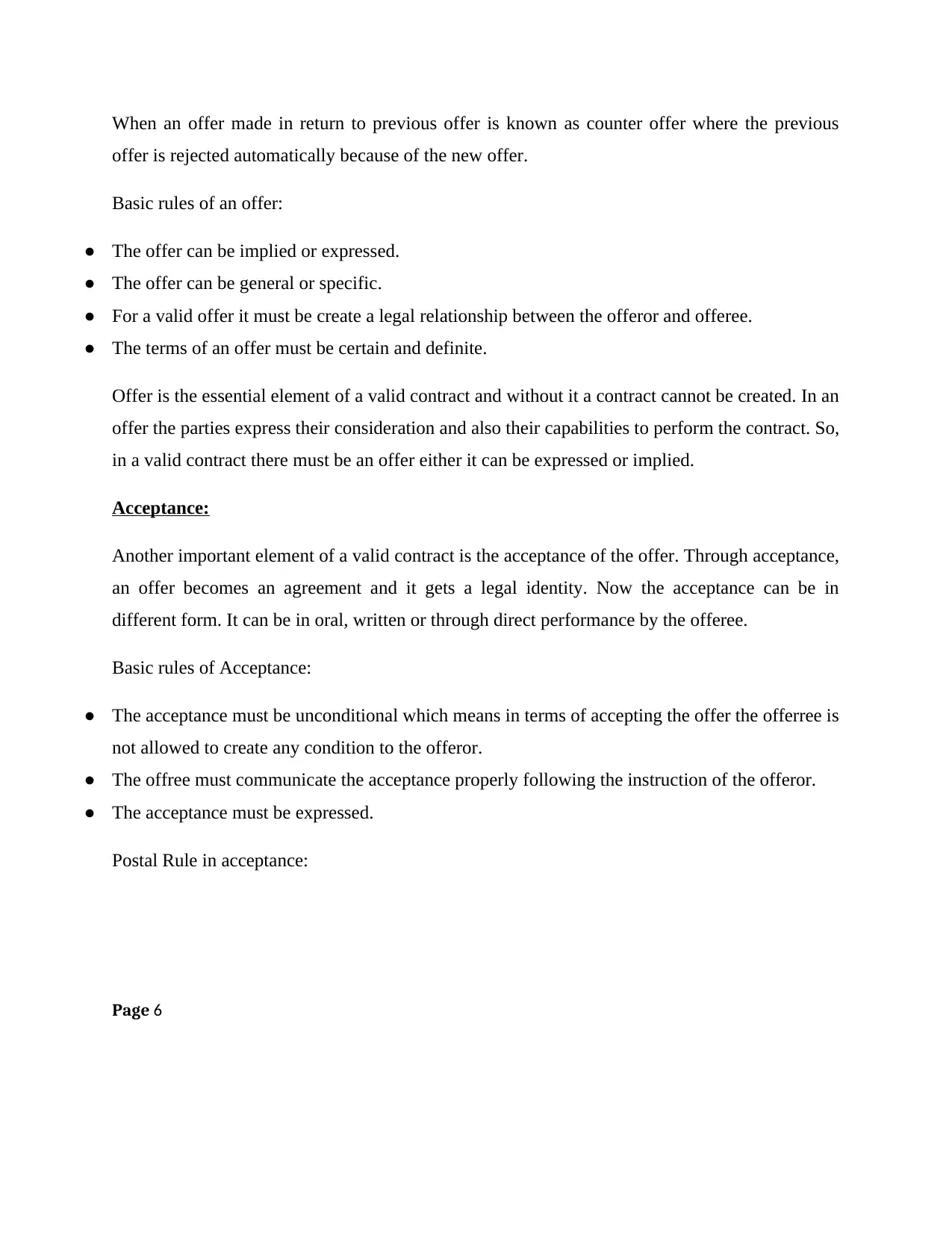
When an offer made in return to previous offer is known as counter offer where the previous
offer is rejected automatically because of the new offer.
Basic rules of an offer:
● The offer can be implied or expressed.
● The offer can be general or specific.
● For a valid offer it must be create a legal relationship between the offeror and offeree.
● The terms of an offer must be certain and definite.
Offer is the essential element of a valid contract and without it a contract cannot be created. In an
offer the parties express their consideration and also their capabilities to perform the contract. So,
in a valid contract there must be an offer either it can be expressed or implied.
Acceptance:
Another important element of a valid contract is the acceptance of the offer. Through acceptance,
an offer becomes an agreement and it gets a legal identity. Now the acceptance can be in
different form. It can be in oral, written or through direct performance by the offeree.
Basic rules of Acceptance:
● The acceptance must be unconditional which means in terms of accepting the offer the offerree is
not allowed to create any condition to the offeror.
● The offree must communicate the acceptance properly following the instruction of the offeror.
● The acceptance must be expressed.
Postal Rule in acceptance:
Page 6
offer is rejected automatically because of the new offer.
Basic rules of an offer:
● The offer can be implied or expressed.
● The offer can be general or specific.
● For a valid offer it must be create a legal relationship between the offeror and offeree.
● The terms of an offer must be certain and definite.
Offer is the essential element of a valid contract and without it a contract cannot be created. In an
offer the parties express their consideration and also their capabilities to perform the contract. So,
in a valid contract there must be an offer either it can be expressed or implied.
Acceptance:
Another important element of a valid contract is the acceptance of the offer. Through acceptance,
an offer becomes an agreement and it gets a legal identity. Now the acceptance can be in
different form. It can be in oral, written or through direct performance by the offeree.
Basic rules of Acceptance:
● The acceptance must be unconditional which means in terms of accepting the offer the offerree is
not allowed to create any condition to the offeror.
● The offree must communicate the acceptance properly following the instruction of the offeror.
● The acceptance must be expressed.
Postal Rule in acceptance:
Page 6
⊘ This is a preview!⊘
Do you want full access?
Subscribe today to unlock all pages.

Trusted by 1+ million students worldwide
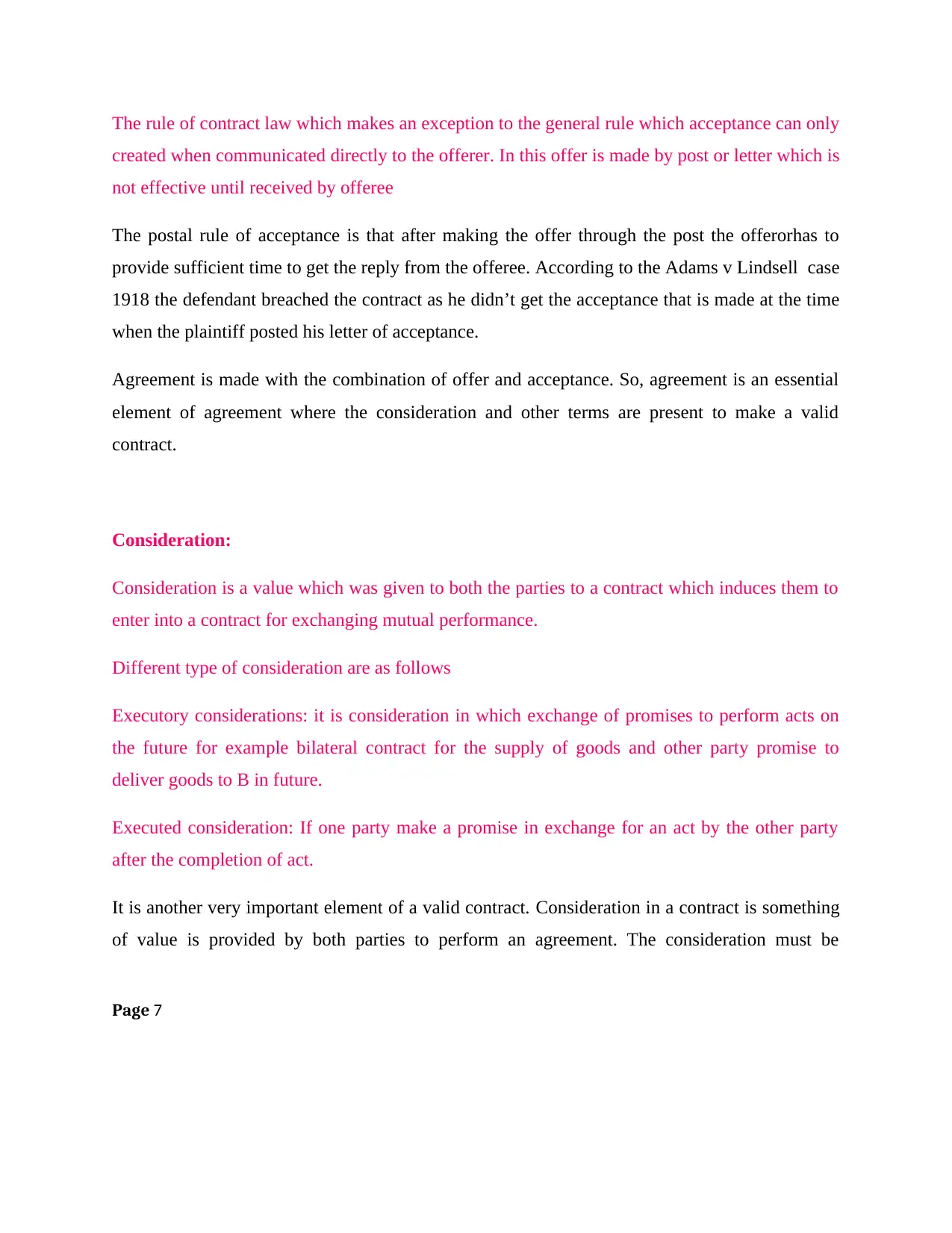
The rule of contract law which makes an exception to the general rule which acceptance can only
created when communicated directly to the offerer. In this offer is made by post or letter which is
not effective until received by offeree
The postal rule of acceptance is that after making the offer through the post the offerorhas to
provide sufficient time to get the reply from the offeree. According to the Adams v Lindsell case
1918 the defendant breached the contract as he didn’t get the acceptance that is made at the time
when the plaintiff posted his letter of acceptance.
Agreement is made with the combination of offer and acceptance. So, agreement is an essential
element of agreement where the consideration and other terms are present to make a valid
contract.
Consideration:
Consideration is a value which was given to both the parties to a contract which induces them to
enter into a contract for exchanging mutual performance.
Different type of consideration are as follows
Executory considerations: it is consideration in which exchange of promises to perform acts on
the future for example bilateral contract for the supply of goods and other party promise to
deliver goods to B in future.
Executed consideration: If one party make a promise in exchange for an act by the other party
after the completion of act.
It is another very important element of a valid contract. Consideration in a contract is something
of value is provided by both parties to perform an agreement. The consideration must be
Page 7
created when communicated directly to the offerer. In this offer is made by post or letter which is
not effective until received by offeree
The postal rule of acceptance is that after making the offer through the post the offerorhas to
provide sufficient time to get the reply from the offeree. According to the Adams v Lindsell case
1918 the defendant breached the contract as he didn’t get the acceptance that is made at the time
when the plaintiff posted his letter of acceptance.
Agreement is made with the combination of offer and acceptance. So, agreement is an essential
element of agreement where the consideration and other terms are present to make a valid
contract.
Consideration:
Consideration is a value which was given to both the parties to a contract which induces them to
enter into a contract for exchanging mutual performance.
Different type of consideration are as follows
Executory considerations: it is consideration in which exchange of promises to perform acts on
the future for example bilateral contract for the supply of goods and other party promise to
deliver goods to B in future.
Executed consideration: If one party make a promise in exchange for an act by the other party
after the completion of act.
It is another very important element of a valid contract. Consideration in a contract is something
of value is provided by both parties to perform an agreement. The consideration must be
Page 7
Paraphrase This Document
Need a fresh take? Get an instant paraphrase of this document with our AI Paraphraser
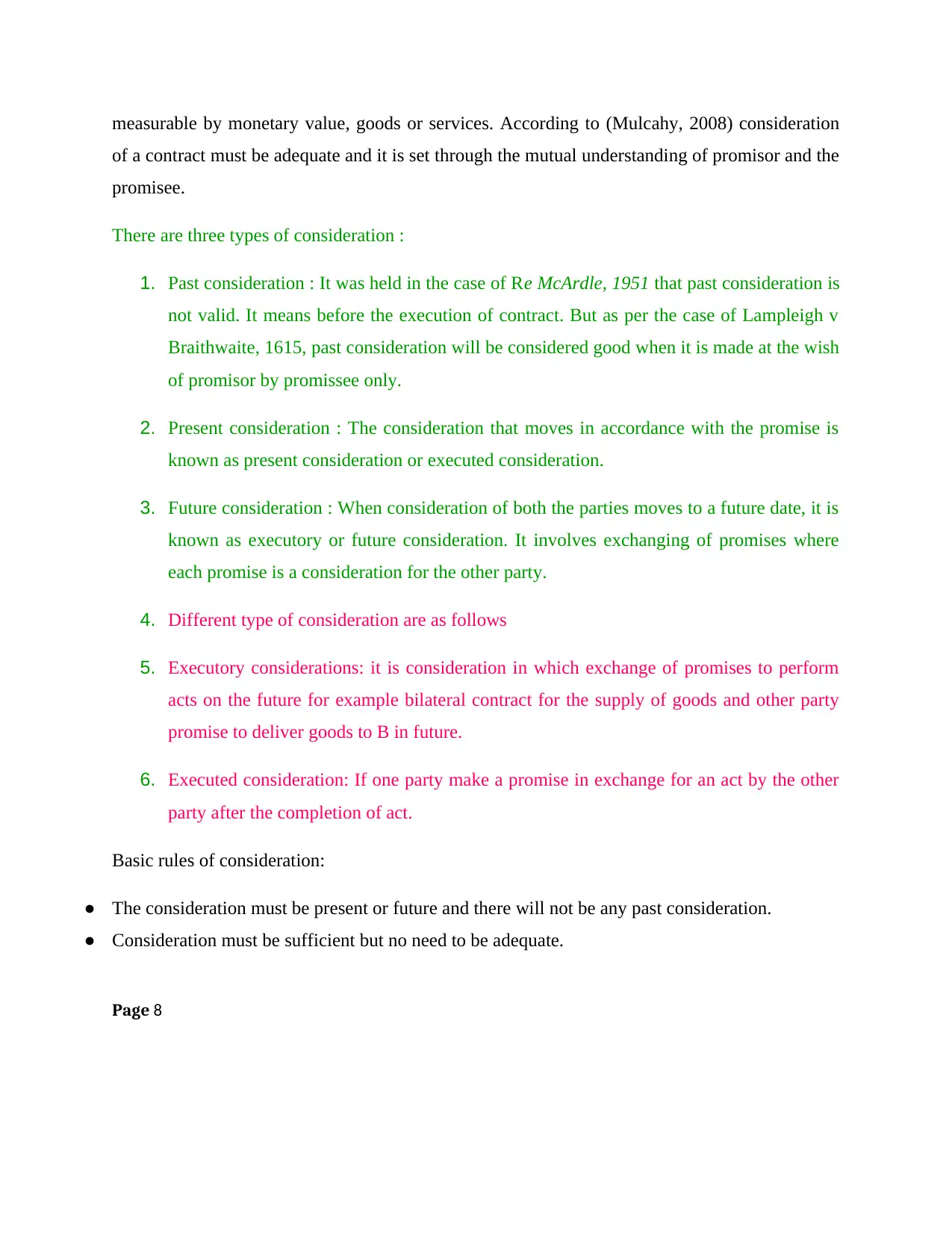
measurable by monetary value, goods or services. According to (Mulcahy, 2008) consideration
of a contract must be adequate and it is set through the mutual understanding of promisor and the
promisee.
There are three types of consideration :
1. Past consideration : It was held in the case of Re McArdle, 1951 that past consideration is
not valid. It means before the execution of contract. But as per the case of Lampleigh v
Braithwaite, 1615, past consideration will be considered good when it is made at the wish
of promisor by promissee only.
2. Present consideration : The consideration that moves in accordance with the promise is
known as present consideration or executed consideration.
3. Future consideration : When consideration of both the parties moves to a future date, it is
known as executory or future consideration. It involves exchanging of promises where
each promise is a consideration for the other party.
4. Different type of consideration are as follows
5. Executory considerations: it is consideration in which exchange of promises to perform
acts on the future for example bilateral contract for the supply of goods and other party
promise to deliver goods to B in future.
6. Executed consideration: If one party make a promise in exchange for an act by the other
party after the completion of act.
Basic rules of consideration:
● The consideration must be present or future and there will not be any past consideration.
● Consideration must be sufficient but no need to be adequate.
Page 8
of a contract must be adequate and it is set through the mutual understanding of promisor and the
promisee.
There are three types of consideration :
1. Past consideration : It was held in the case of Re McArdle, 1951 that past consideration is
not valid. It means before the execution of contract. But as per the case of Lampleigh v
Braithwaite, 1615, past consideration will be considered good when it is made at the wish
of promisor by promissee only.
2. Present consideration : The consideration that moves in accordance with the promise is
known as present consideration or executed consideration.
3. Future consideration : When consideration of both the parties moves to a future date, it is
known as executory or future consideration. It involves exchanging of promises where
each promise is a consideration for the other party.
4. Different type of consideration are as follows
5. Executory considerations: it is consideration in which exchange of promises to perform
acts on the future for example bilateral contract for the supply of goods and other party
promise to deliver goods to B in future.
6. Executed consideration: If one party make a promise in exchange for an act by the other
party after the completion of act.
Basic rules of consideration:
● The consideration must be present or future and there will not be any past consideration.
● Consideration must be sufficient but no need to be adequate.
Page 8
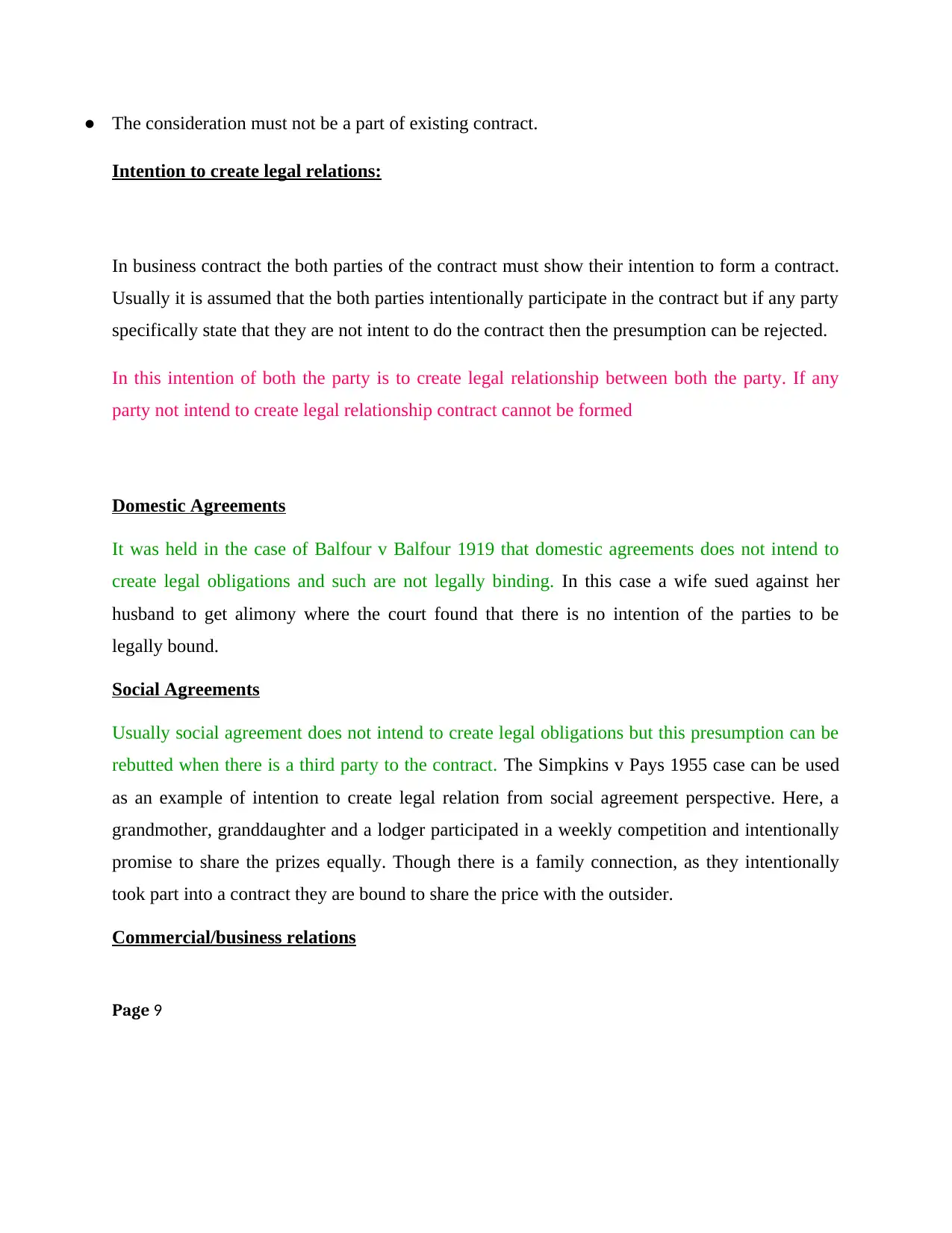
● The consideration must not be a part of existing contract.
Intention to create legal relations:
In business contract the both parties of the contract must show their intention to form a contract.
Usually it is assumed that the both parties intentionally participate in the contract but if any party
specifically state that they are not intent to do the contract then the presumption can be rejected.
In this intention of both the party is to create legal relationship between both the party. If any
party not intend to create legal relationship contract cannot be formed
Domestic Agreements
It was held in the case of Balfour v Balfour 1919 that domestic agreements does not intend to
create legal obligations and such are not legally binding. In this case a wife sued against her
husband to get alimony where the court found that there is no intention of the parties to be
legally bound.
Social Agreements
Usually social agreement does not intend to create legal obligations but this presumption can be
rebutted when there is a third party to the contract. The Simpkins v Pays 1955 case can be used
as an example of intention to create legal relation from social agreement perspective. Here, a
grandmother, granddaughter and a lodger participated in a weekly competition and intentionally
promise to share the prizes equally. Though there is a family connection, as they intentionally
took part into a contract they are bound to share the price with the outsider.
Commercial/business relations
Page 9
Intention to create legal relations:
In business contract the both parties of the contract must show their intention to form a contract.
Usually it is assumed that the both parties intentionally participate in the contract but if any party
specifically state that they are not intent to do the contract then the presumption can be rejected.
In this intention of both the party is to create legal relationship between both the party. If any
party not intend to create legal relationship contract cannot be formed
Domestic Agreements
It was held in the case of Balfour v Balfour 1919 that domestic agreements does not intend to
create legal obligations and such are not legally binding. In this case a wife sued against her
husband to get alimony where the court found that there is no intention of the parties to be
legally bound.
Social Agreements
Usually social agreement does not intend to create legal obligations but this presumption can be
rebutted when there is a third party to the contract. The Simpkins v Pays 1955 case can be used
as an example of intention to create legal relation from social agreement perspective. Here, a
grandmother, granddaughter and a lodger participated in a weekly competition and intentionally
promise to share the prizes equally. Though there is a family connection, as they intentionally
took part into a contract they are bound to share the price with the outsider.
Commercial/business relations
Page 9
⊘ This is a preview!⊘
Do you want full access?
Subscribe today to unlock all pages.

Trusted by 1+ million students worldwide
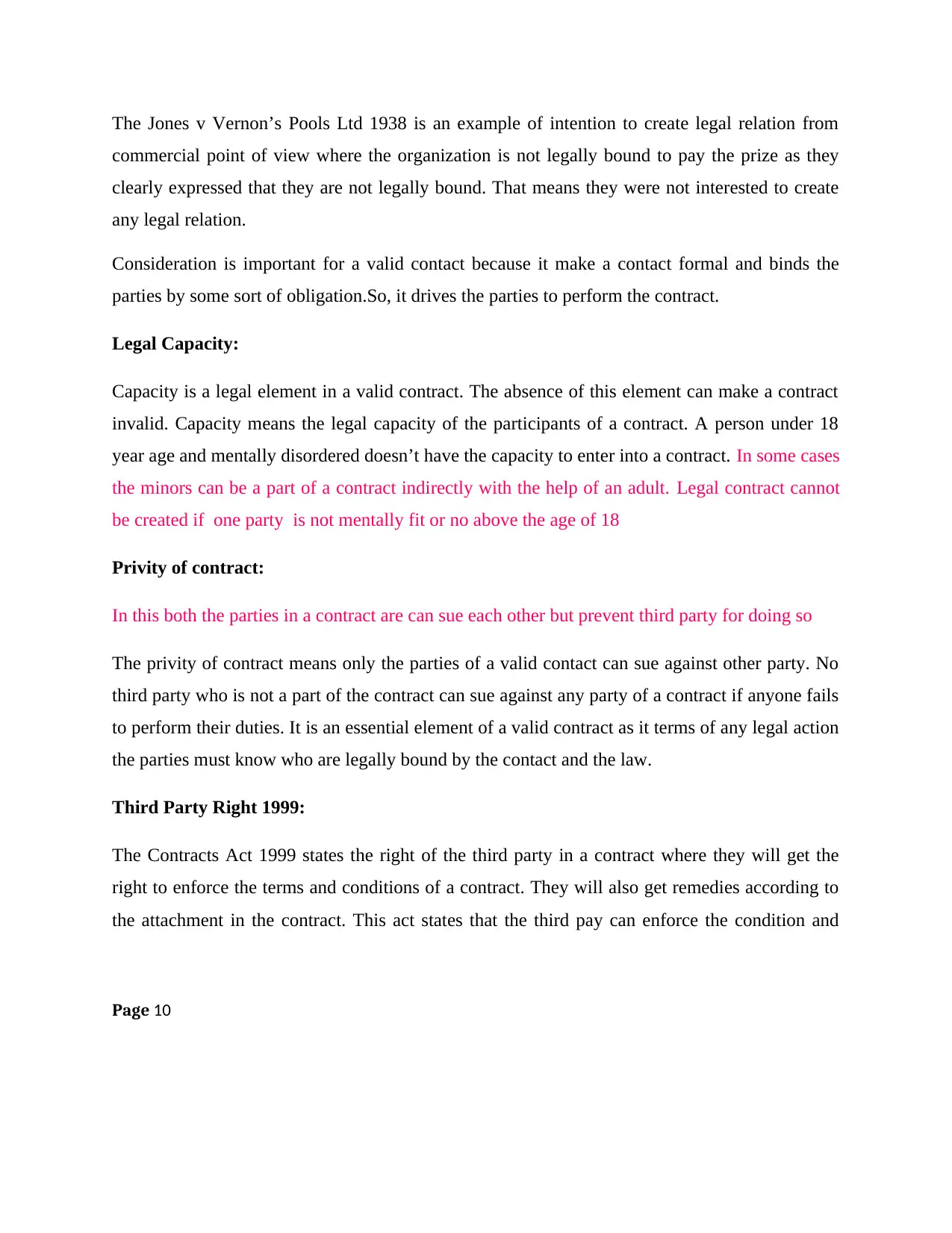
The Jones v Vernon’s Pools Ltd 1938 is an example of intention to create legal relation from
commercial point of view where the organization is not legally bound to pay the prize as they
clearly expressed that they are not legally bound. That means they were not interested to create
any legal relation.
Consideration is important for a valid contact because it make a contact formal and binds the
parties by some sort of obligation.So, it drives the parties to perform the contract.
Legal Capacity:
Capacity is a legal element in a valid contract. The absence of this element can make a contract
invalid. Capacity means the legal capacity of the participants of a contract. A person under 18
year age and mentally disordered doesn’t have the capacity to enter into a contract. In some cases
the minors can be a part of a contract indirectly with the help of an adult. Legal contract cannot
be created if one party is not mentally fit or no above the age of 18
Privity of contract:
In this both the parties in a contract are can sue each other but prevent third party for doing so
The privity of contract means only the parties of a valid contact can sue against other party. No
third party who is not a part of the contract can sue against any party of a contract if anyone fails
to perform their duties. It is an essential element of a valid contract as it terms of any legal action
the parties must know who are legally bound by the contact and the law.
Third Party Right 1999:
The Contracts Act 1999 states the right of the third party in a contract where they will get the
right to enforce the terms and conditions of a contract. They will also get remedies according to
the attachment in the contract. This act states that the third pay can enforce the condition and
Page 10
commercial point of view where the organization is not legally bound to pay the prize as they
clearly expressed that they are not legally bound. That means they were not interested to create
any legal relation.
Consideration is important for a valid contact because it make a contact formal and binds the
parties by some sort of obligation.So, it drives the parties to perform the contract.
Legal Capacity:
Capacity is a legal element in a valid contract. The absence of this element can make a contract
invalid. Capacity means the legal capacity of the participants of a contract. A person under 18
year age and mentally disordered doesn’t have the capacity to enter into a contract. In some cases
the minors can be a part of a contract indirectly with the help of an adult. Legal contract cannot
be created if one party is not mentally fit or no above the age of 18
Privity of contract:
In this both the parties in a contract are can sue each other but prevent third party for doing so
The privity of contract means only the parties of a valid contact can sue against other party. No
third party who is not a part of the contract can sue against any party of a contract if anyone fails
to perform their duties. It is an essential element of a valid contract as it terms of any legal action
the parties must know who are legally bound by the contact and the law.
Third Party Right 1999:
The Contracts Act 1999 states the right of the third party in a contract where they will get the
right to enforce the terms and conditions of a contract. They will also get remedies according to
the attachment in the contract. This act states that the third pay can enforce the condition and
Page 10
Paraphrase This Document
Need a fresh take? Get an instant paraphrase of this document with our AI Paraphraser
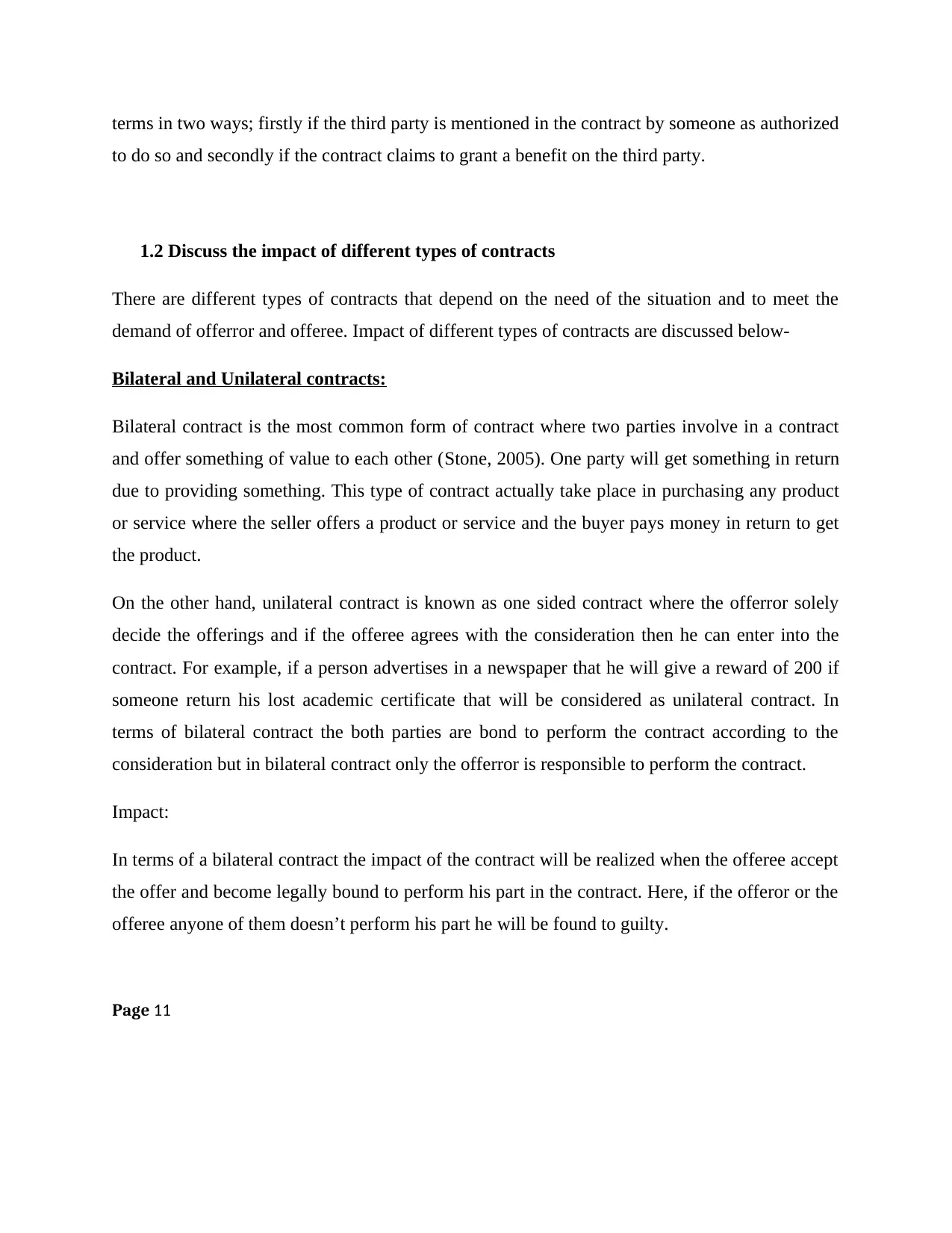
terms in two ways; firstly if the third party is mentioned in the contract by someone as authorized
to do so and secondly if the contract claims to grant a benefit on the third party.
1.2 Discuss the impact of different types of contracts
There are different types of contracts that depend on the need of the situation and to meet the
demand of offerror and offeree. Impact of different types of contracts are discussed below-
Bilateral and Unilateral contracts:
Bilateral contract is the most common form of contract where two parties involve in a contract
and offer something of value to each other (Stone, 2005). One party will get something in return
due to providing something. This type of contract actually take place in purchasing any product
or service where the seller offers a product or service and the buyer pays money in return to get
the product.
On the other hand, unilateral contract is known as one sided contract where the offerror solely
decide the offerings and if the offeree agrees with the consideration then he can enter into the
contract. For example, if a person advertises in a newspaper that he will give a reward of 200 if
someone return his lost academic certificate that will be considered as unilateral contract. In
terms of bilateral contract the both parties are bond to perform the contract according to the
consideration but in bilateral contract only the offerror is responsible to perform the contract.
Impact:
In terms of a bilateral contract the impact of the contract will be realized when the offeree accept
the offer and become legally bound to perform his part in the contract. Here, if the offeror or the
offeree anyone of them doesn’t perform his part he will be found to guilty.
Page 11
to do so and secondly if the contract claims to grant a benefit on the third party.
1.2 Discuss the impact of different types of contracts
There are different types of contracts that depend on the need of the situation and to meet the
demand of offerror and offeree. Impact of different types of contracts are discussed below-
Bilateral and Unilateral contracts:
Bilateral contract is the most common form of contract where two parties involve in a contract
and offer something of value to each other (Stone, 2005). One party will get something in return
due to providing something. This type of contract actually take place in purchasing any product
or service where the seller offers a product or service and the buyer pays money in return to get
the product.
On the other hand, unilateral contract is known as one sided contract where the offerror solely
decide the offerings and if the offeree agrees with the consideration then he can enter into the
contract. For example, if a person advertises in a newspaper that he will give a reward of 200 if
someone return his lost academic certificate that will be considered as unilateral contract. In
terms of bilateral contract the both parties are bond to perform the contract according to the
consideration but in bilateral contract only the offerror is responsible to perform the contract.
Impact:
In terms of a bilateral contract the impact of the contract will be realized when the offeree accept
the offer and become legally bound to perform his part in the contract. Here, if the offeror or the
offeree anyone of them doesn’t perform his part he will be found to guilty.
Page 11
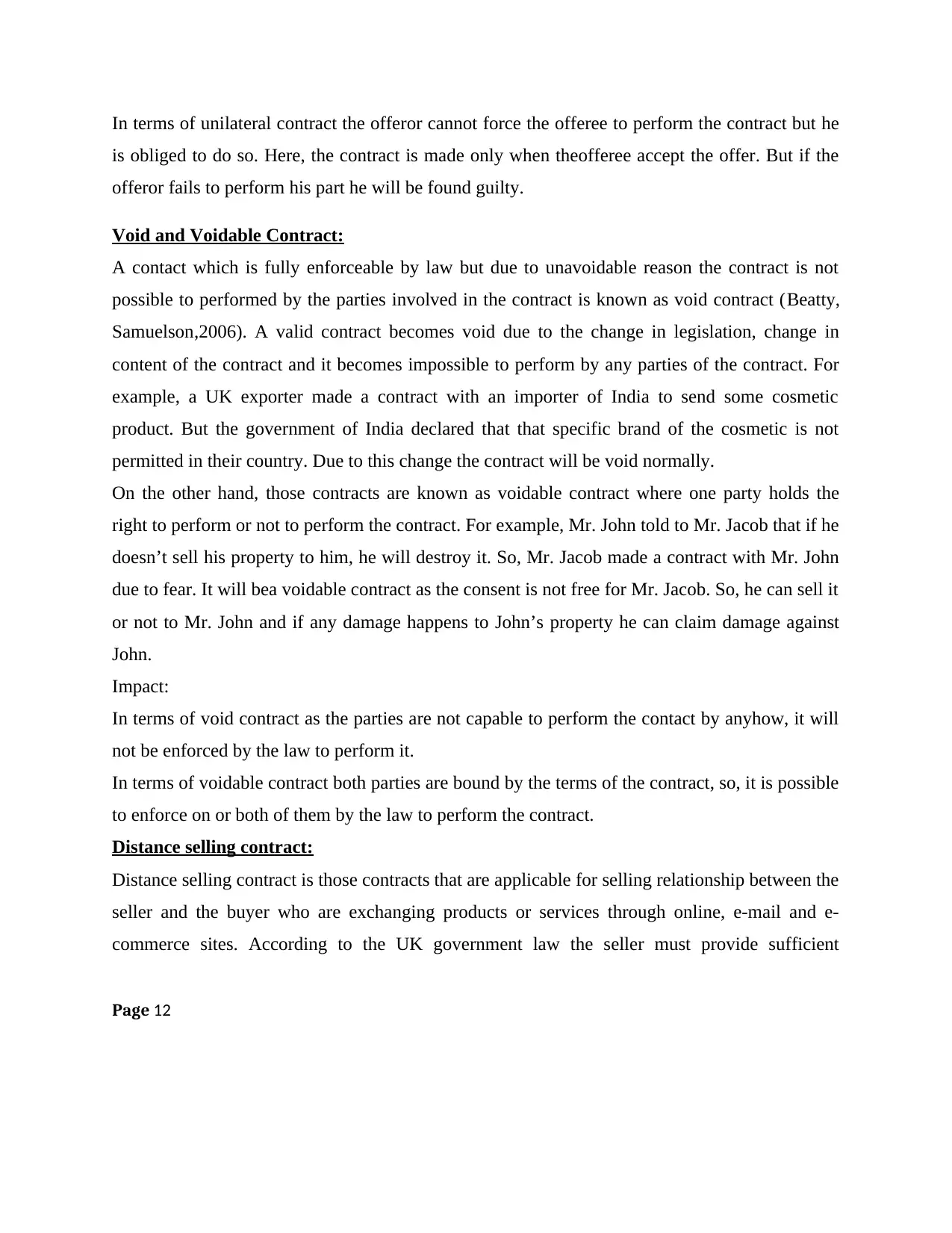
In terms of unilateral contract the offeror cannot force the offeree to perform the contract but he
is obliged to do so. Here, the contract is made only when theofferee accept the offer. But if the
offeror fails to perform his part he will be found guilty.
Void and Voidable Contract:
A contact which is fully enforceable by law but due to unavoidable reason the contract is not
possible to performed by the parties involved in the contract is known as void contract (Beatty,
Samuelson,2006). A valid contract becomes void due to the change in legislation, change in
content of the contract and it becomes impossible to perform by any parties of the contract. For
example, a UK exporter made a contract with an importer of India to send some cosmetic
product. But the government of India declared that that specific brand of the cosmetic is not
permitted in their country. Due to this change the contract will be void normally.
On the other hand, those contracts are known as voidable contract where one party holds the
right to perform or not to perform the contract. For example, Mr. John told to Mr. Jacob that if he
doesn’t sell his property to him, he will destroy it. So, Mr. Jacob made a contract with Mr. John
due to fear. It will bea voidable contract as the consent is not free for Mr. Jacob. So, he can sell it
or not to Mr. John and if any damage happens to John’s property he can claim damage against
John.
Impact:
In terms of void contract as the parties are not capable to perform the contact by anyhow, it will
not be enforced by the law to perform it.
In terms of voidable contract both parties are bound by the terms of the contract, so, it is possible
to enforce on or both of them by the law to perform the contract.
Distance selling contract:
Distance selling contract is those contracts that are applicable for selling relationship between the
seller and the buyer who are exchanging products or services through online, e-mail and e-
commerce sites. According to the UK government law the seller must provide sufficient
Page 12
is obliged to do so. Here, the contract is made only when theofferee accept the offer. But if the
offeror fails to perform his part he will be found guilty.
Void and Voidable Contract:
A contact which is fully enforceable by law but due to unavoidable reason the contract is not
possible to performed by the parties involved in the contract is known as void contract (Beatty,
Samuelson,2006). A valid contract becomes void due to the change in legislation, change in
content of the contract and it becomes impossible to perform by any parties of the contract. For
example, a UK exporter made a contract with an importer of India to send some cosmetic
product. But the government of India declared that that specific brand of the cosmetic is not
permitted in their country. Due to this change the contract will be void normally.
On the other hand, those contracts are known as voidable contract where one party holds the
right to perform or not to perform the contract. For example, Mr. John told to Mr. Jacob that if he
doesn’t sell his property to him, he will destroy it. So, Mr. Jacob made a contract with Mr. John
due to fear. It will bea voidable contract as the consent is not free for Mr. Jacob. So, he can sell it
or not to Mr. John and if any damage happens to John’s property he can claim damage against
John.
Impact:
In terms of void contract as the parties are not capable to perform the contact by anyhow, it will
not be enforced by the law to perform it.
In terms of voidable contract both parties are bound by the terms of the contract, so, it is possible
to enforce on or both of them by the law to perform the contract.
Distance selling contract:
Distance selling contract is those contracts that are applicable for selling relationship between the
seller and the buyer who are exchanging products or services through online, e-mail and e-
commerce sites. According to the UK government law the seller must provide sufficient
Page 12
⊘ This is a preview!⊘
Do you want full access?
Subscribe today to unlock all pages.

Trusted by 1+ million students worldwide
1 out of 26
Related Documents
Your All-in-One AI-Powered Toolkit for Academic Success.
+13062052269
info@desklib.com
Available 24*7 on WhatsApp / Email
![[object Object]](/_next/static/media/star-bottom.7253800d.svg)
Unlock your academic potential
Copyright © 2020–2026 A2Z Services. All Rights Reserved. Developed and managed by ZUCOL.





